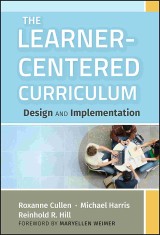Details

The Learner-Centered Curriculum
Design and Implementation1. Aufl.
|
35,99 € |
|
| Verlag: | Wiley |
| Format: | |
| Veröffentl.: | 03.02.2012 |
| ISBN/EAN: | 9781118171004 |
| Sprache: | englisch |
| Anzahl Seiten: | 272 |
DRM-geschütztes eBook, Sie benötigen z.B. Adobe Digital Editions und eine Adobe ID zum Lesen.
Beschreibungen
<p><b>THE LEARNER-CENTERED CURRICULUM </b></p> <p><i>“If an institution is to be truly learner-centered, all processes and practices need to be learner-centered, and the curriculum is no exception.”</i>—From the Preface <p><i>The Learner-Centered Curriculum</i> is for educators and administrators who envision an educational environment that produces students who are creative and autonomous learners. By encouraging an appreciation and adoption of learner-centered practices, educators can transform their curricula to become more focused on the learner. <p>The book presents a framework for curriculum design based on learner-centered principles while at the same time offering technical advice on implementation as well as the strategic use of assessment, technology, and physical spaces to support innovative design. The authors include several examples of existing curricula that illustrate their framework in practice. Throughout the book, they emphasize the need for assessment, both formative and summative, stressing the point that assessment is an effective driver of change. The book includes a wide variety of options both for individual classroom practice and for programmatic assessment. <p><i>The Learner-Centered Curriculum</i> explores the current technology and tools available to educators that can support learner-centered practices and foster autonomous learning and demonstrates how technology can assist in removing some of the obstacles to achieving a learner-centered design. In addition, the authors explain the importance of physical spaces in relation to learner-centered curricular design and show how to tie renovation to curricular implementation to foster incentive to innovate and provide a physical manifestation of learner-centered principles.
<p>Foreword ix</p> <p>Preface xiii</p> <p>Acknowledgments xix</p> <p>About the Authors xxi</p> <p>1. Why Redesign Curriculum? 1</p> <p>2. Curriculum Design in the Instructional Paradigm 23</p> <p>3. The Learner-Centered Curriculum 45</p> <p>4. Leading Curricular Implementation 73</p> <p>5. Learner-Centered Design in Practice 105</p> <p>6. Assessment Aimed at Learner Autonomy 127</p> <p>7. Innovating Through Technology 159</p> <p>8. Learning Spaces That Support Learner-Centered Curricula 183</p> <p>Closing Thoughts 209</p> <p>References 211</p> <p>Index 227</p>
<p><b>THE AUTHORS</b></p> <p><b>Roxanne Cullen</b> is a professor of English at Ferris State University in Big Rapids, Michigan, where she has also acted as associate vice president for academic affairs. <p><b>Michael Harris</b> is the chancellor of Indiana University-Kokomo. He and Roxanne Cullen coauthored <i>Leading the Learner-Centered Campus: An Administrative Framework for Improving Student Learning Outcomes</i> from Jossey-Bass. <p><b>Reinhold R. Hill</b> is dean of the College of Arts and Sciences at Governors State University in Illinois.
<p><b>THE LEARNER-CENTERED CURRICULUM </b></p> <p><i>“If an institution is to be truly learner-centered, all processes and practices need to be learner-centered, and the curriculum is no exception.”</i>—From the Preface <p><i>The Learner-Centered Curriculum</i> is for educators and administrators who envision an educational environment that produces students who are creative and autonomous learners. By encouraging an appreciation and adoption of learner-centered practices, educators can transform their curricula to become more focused on the learner. <p>The book presents a framework for curriculum design based on learner-centered principles while at the same time offering technical advice on implementation as well as the strategic use of assessment, technology, and physical spaces to support innovative design. The authors include several examples of existing curricula that illustrate their framework in practice. Throughout the book, they emphasize the need for assessment, both formative and summative, stressing the point that assessment is an effective driver of change. The book includes a wide variety of options both for individual classroom practice and for programmatic assessment. <p><i>The Learner-Centered Curriculum</i> explores the current technology and tools available to educators that can support learner-centered practices and foster autonomous learning and demonstrates how technology can assist in removing some of the obstacles to achieving a learner-centered design. In addition, the authors explain the importance of physical spaces in relation to learner-centered curricular design and show how to tie renovation to curricular implementation to foster incentive to innovate and provide a physical manifestation of learner-centered principles.
Diese Produkte könnten Sie auch interessieren:

Budgets and Financial Management in Higher Education

von: Margaret J. Barr, George S. McClellan

38,99 €
















